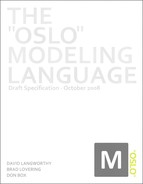Book Description
The “Oslo” Modeling Language (commonly referred to as "M") is a language for defining domain models and languages (the latter are often referred to as textual DSLs). "M" was created to allow developers to efficiently capture their intention in a form that is natural to author but also efficient to store and query using off-the-shelf database technology.
This book comes from the original creators of "M"--David Langworthy, Brad Lovering, and Don Box--and is the definitive reference to the language. If you are looking for a compact textual notation for writing down information or schematizing structured and unstructured data, this book is for you.
This book is the authoritative specification of the "M" language (draft) and describes the syntax and underlying model of the language. Highlights of this book include:
• An Introduction to domain modeling constructs
• An Introduction to constructs for building textual DSLs
• Complete syntax for the language
• Definition of the "M" type system and data model
• Glossary of terms
Table of Contents
- Copyright
- Preface
- Acknowledgments
- About the Authors
- I. “Oslo” Modeling Language Specification
- 1. Introduction to “M”
- 2. Lexical Structure
- 2.1. Programs
- 2.2. Grammars
- 2.3. Lexical Analysis
- 2.4. Tokens
- 2.4.1. Identifiers
- 2.4.2. Keywords
- 2.4.3. Literals
- 2.4.3.1. Decimal Literals
- 2.4.3.2. Integer Literals
- 2.4.3.3. Scientific Literals
- 2.4.3.4. Date Literals
- 2.4.3.5. DateTime Literals
- 2.4.3.6. Time Literals
- 2.4.3.7. Character Literals
- 2.4.3.8. Text Literals
- 2.4.3.9. Logical Literals
- 2.4.3.10. Binary and Byte Literals
- 2.4.3.11. Null Literal
- 2.4.3.12. Guid Literals
- 2.4.4. Operators and Punctuators
- 2.5. Pre-processing Directives
- 3. Types
- 4. Computed and Stored Values
- 5. Expressions
- 5.1. Operators
- 5.2. Member Access
- 5.3. Initializers
- 5.4. Invocation Expression
- 5.5. Primary Expressions
- 5.6. Context Variable
- 5.7. Unary Operators
- 5.8. Multiplicity
- 5.9. Arithmetic Operators
- 5.10. Shift Operators
- 5.11. Relational and Type-Testing Operators
- 5.12. Equality Operators
- 5.13. Logical Operators
- 5.14. Conditional Operators
- 5.15. Query Expressions
- 5.16. Compact Query Expressions
- 5.17. Binary and Collection Operators
- 5.18. Expressions
- 6. Module
- II. MGrammar Language Specification
- Glossary
